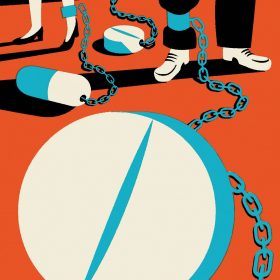While we have been dealing with the pandemic, we have ignored an epidemic that did not stop in the wake of COVID-19.
The opioid epidemic is a severe problem in America but has been completely ignored and forgotten because of the pandemic. However, just because people choose to ignore the problem does not mean that it has stopped happening. People are still battling with their addictions, and forcing them into isolation allows their disease to thrive under the conditions the pandemic has placed on the world.
In 2015, the Center for Disease Control (CDC) reported that since 1999, the number of overdose deaths involving opioids (including prescription opioids heroin) quadrupled. More than half a million people died from a drug overdose (1).
The number of prescription opioids sold to hospitals, pharmacies, and doctor’s offices quadrupled from 1999 to 2010, resulting in deaths resulting in deaths from prescription opioids to also quadruple (1).

Addiction is a disease of isolation, and America has forced these people to isolate themselves from the world and fall into their illness.
2018 was the first time in 25 years that drug deaths fell (2). In 2019 they began to climb, with nearly 72,000 Americans dying of drug overdoses increasing by 5% from 2018 (2).
2020 is the year of record-breaking, and unfortunately, drug overdoses can be included in those 2020 recording-breaking statistics. Since we are still in 2020, we can only report for half the year so far, and yet drug overdoses increased by 13% from 2019 (2). More than 35 states have reported increases in opioid-related mortality. New Jersey alone reported an increase of 17% of overdose deaths.
There has been a strong correlation established through years of research that demonstrates a stagnating economy; there is an increase in suicides, drug use, and overdose (3).
Traci Green, an epidemiologist at Brown University studying drug abuse and addiction, told the New York Times, “Social isolation has always been a huge component of drug overdose risk.” (2).
The isolation of quarantine is even more dangerous for drug addicts because isolation forces them to use the drug alone, and if they overdose, there is no one around to get help.
Due to the poor economy, many in-person treatment centers are being forced to shut down. Chuck Ingoglia, president of the National Council for Behavioral Health, which represents 3,326 treatment centers, reported that 44% of their council members said they would have to shut down because they will run out of money within the next six months (3).
While we have the advantage of technology to conduct our business and continue our relationships with people without leaving the comfort of our houses, we are still human beings. We need in-person human connection and support.
The pandemic has made people forget about the opioid epidemic and left people to die from this terrible disease of addiction.
Sources:
1: Adler, S. (2019). The ABCs of CBD: Why pot is not what we were taught: The essential guide. S. Salem, NY: ValPoSa Books.
2: Katz, J., Goodnough, A., & Sanger-katz, M. (2020, July 15). In Shadow of Pandemic, U.S. Drug Overdose Deaths Resurge to Record. Retrieved July 25, 2020, from https://www.nytimes.com/interactive/2020/07/15/upshot/drug-overdose-deaths.html
3: Wan, W., & Long, H. (2020, July 01). ‘Cries for help’: Drug overdoses are soaring during the coronavirus pandemic. Retrieved July 25, 2020, from https://www.washingtonpost.com/health/2020/07/01/coronavirus-drug-overdose/